Responses to recent tweets by people about personal branding and Gen-Y, Twitter, presentations and lack of focus.
Jeff Putthoff, @putthoff, twittered: #comingofage having a personal brand as a youth. Is it possible to think about this at such a young age? Ti me is a different perspective
 Jacob Share, @jacobshare: It’s true. On the one hand, I try to think back to when I was a teenager, trying to imagine if personal branding was something I could have cared about. On the other hand, people are a product of the times they live in, which is why the younger generation always seem to grasp new ideas quicker than the older generations. So yes, today’s youth can definitely handle it, if they want to. For the most part though, I don’t think that they do want to; they just want to have fun and hang out.
Jacob Share, @jacobshare: It’s true. On the one hand, I try to think back to when I was a teenager, trying to imagine if personal branding was something I could have cared about. On the other hand, people are a product of the times they live in, which is why the younger generation always seem to grasp new ideas quicker than the older generations. So yes, today’s youth can definitely handle it, if they want to. For the most part though, I don’t think that they do want to; they just want to have fun and hang out.
Any smart brand building is good, of course, but it’s not nearly as important for teens as it is for careerists. However, the dangers of negative branding are just as present unfortunately.
As long as someone they trust – parents, family, teachers, other friends – can convince them to be careful about their online reputation with some simple tips about privacy and what not to post online, most teens will be fine.
Justin Kownacki, @JustinKownacki, twittered: @shawn But… but how… how will you monetize your personal brand and leverage your virtual community to… to crush it?
Jacob Share, @jacobshare: There are many ways to monetize your personal brand and leverage your following. The simplest and most common way is to get job offers from those people who know best what you can do and want your best for their organization.
One story in my ebook about using Twitter for job search tells of a web developer who was laid off, and used her Blackberry to tweet it as soon as she found out. Although she had less than 200 followers at the time, they were so engaged with her that a job offer had been tweeted back to her before she left her ex-employer’s parking lot.
Other classic ways of monetizing your brand involve creating a product or service and asking your community for help in spreading the word (and hopefully buying it too). When Dan released “Me 2.0”, that’s exactly what he did, like Tim Ferriss and so many other youngish authors.
Finally, depending on your personal brand, you can align yourself with an industry player with similar values, for pay of course. Which fits nicely with the next question…
Lindsey Wahlstrom, @lwahlstrom, twittered: How important is the personal brand for the corporate brand?
Jacob Share, @jacobshare: Most personal brands have little-to-no relevance for their employers’ corporate brands, since until recently, most companies didn’t understand the benefits of a) having their own clearly focused brand and b) having employees with values that naturally align with the company’s clearly focused brand.
Now that more employers are thinking about the image their employees are (or could be) projecting on social media, it’s become more important to consider personal branding in the hiring conversation. That’s just the reality we live in, where one employee’s tweet, intentionally or not, can have a dramatic impact on the public’s perception of the company.
Even employees with internal-facing jobs can have a branding impact, whether it’s on social media or just networking at business conferences.
Penny Haw, @PennyHaw, twittered: @jdrsampson Clear enough. The question is where does personal brand end and corporate brand begin on social media? Is there a distinction?
Jacob Share, @jacobshare: smart corporations have social media policies about what is permitted online for their average employees.
If you’re an employee with social media activity as part of your job description, it’s up to you and your employer to find an arrangement that works for you, or else you should find another employer with an arrangement that works for you.
The arrangement would mean different things to different people, especially if you were hired specifically with the idea of aligning your personal brand with the company’s brand , in which case you would typically be expected to use all your relevant web presences to implement the company branding strategy.
On a practical level, this could mean that your Facebook page might need to be used for company purposes, or your personal profile, or both. And if you specially want a line drawn, you could insist on keeping the personal profile out of the arrangement.
Author:
Jacob Share, a job search expert, is the creator of JobMob, one of the biggest blogs in the world about finding jobs. Follow him on Twitter for job search tips and humor.












